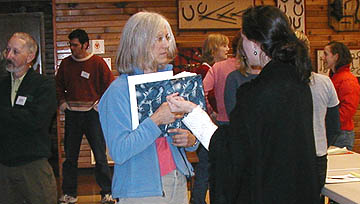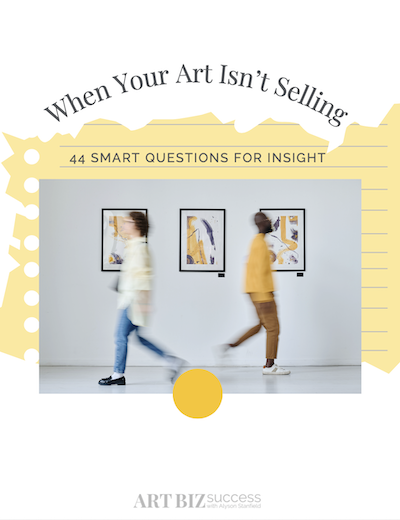As I mention in this week’s Art Marketing Action Newsletter, speaking to strangers at parties and art openings is daunting. You begin to doubt:
- What if I don’t know anyone there?
- How do I break the ice and introduce myself?
- What if no one wants to talk to me?
- How do I carry on a conversation after the ice is finally broken?
- What if someone actually asks me about my art? I haven’t talked about it much. I might say something wrong.

In my self-promotion workshops, I try to help artists conquer these fears. I break them up into pairs and practice their ten-second introductions with each other. After they do that, they are to find something they have in common and how they might work together. Networking is a two-way street. That’s why focusing on what you have in common and how you can work together is a great exercise. It gives you a goal, a reason, a purpose. Next time you’re in an uncomfortable situation in which you should be introducing yourself, remind yourself of this. You may have a reason for meeting people, but they do as well. Honor that. Listen to them. Hear their needs.
How do you psych yourself up and make the most of uncomfortable situations? Leave your comments below.
Image: Artists practice their networking skills at the workshop in Winthrop, WA.



10 thoughts on “Meeting People at Parties and Art Openings”
I had that experience this weekend in Kerrville at an Art for Artists event — at lunchtime, I just took a deep breath and forced myself to sit at a table of people that I had not spoken to or been introduced to during the activities. And just asked them about their experiences during the weekend. I think really listening is important, not because we want to promote our work, but because we want to be human beings in connection with other humans, and face-to-face conversation about the things that really matter is an aspect of life that is perhaps getting harder, not easier, in this electronic era. Susie PS Alyson — the link in this post to the newsletter was not working this morning, as you can imagine, I was anxious to check it out. S
I just went to a paintout at Princeton Academy this weekend. It was my first experience at anything like this and my firs time being surrounded by artists since gradschool. I am normally very quiet around new people. I usually have no idea what to say. .etc. But I forced myself to talk to people and found that they are just like me. . trying to make it, a little nervous, just came because they love to paint. . .etc. I was easy once we were past the first few sentences. All you have to say is, where are you from, or “what’s your story?” That opens up conversation really fast, and soon you will find common ground. (as if being an arist isn’t common ground enough).
I’m an artist with mental health problems, which affects my ability to get out and about. So, working on the principle that practice makes perfect, I started a group for artists with mental health difficulties in June this year. Already, there’s a visible difference in peoples’ confidence and ability to face difficult situations like this, because they have been coming together regularly within the group and are encouraged to talk about themselves and their work (their illness gets left at the door…). I found myself arranging a book contract in France this year (and in French, too…another story entirely), as well as arranging an exhibit in Germany in two years time. So, if you’re not sure about doing this kind of thing, get together with others and practice, practice, practice…
Alyson, here’s a trick that I have found works for me. ‘Act As If’. Walk into the room and act as if you are confident and like nothing better than to meet new people and strike up conversations. At first you are pretending, but you know what, in no time at all, it gets really easy and comfortable. It’s a bit like playing a role in a movie, but the feeling catches you and you become more confident. Worth a try, trust me.
Perfect, Suzette! Jack Canfield has a whole chapter on this in his book (link in the left column). We should all learn to act “as if.”
Marion, congratulations for taking that step! And bless you for helping others to do the same.
Perfect post for wednesday – was this a subtle hint that I can’t just play with your new cat in the back room the entire time?
Asking others about themselves and their work always is a good way to get over my own anxiety. I often ask people what brought them here (there?) and they are usually quite happy to tell me. It’s a great icebreaker since people come to events and workshops for all sorts of different reasons and it gives them a chance to articulate them. Some of their reasons may be quite informative as well as interesting. By the time they get around to asking me what brought me there, I’ve usually relaxed enough to answer them without verbally falling all over myself…I’ve come to look at events and workshops as opportunities to meet really cool people. Over the years I’ve made many wonderful friends as well as helpful connections at places and events where I didn’t know a soul beforehand.
I went to an art opening on Saturday night and made a big effort to introduce myself to at least 1 person I didn’t know. I ended up meeting three artists I knew of but hadn’t met before and chatted to two people browsing I didn’t know. I also got a lovely note left for me after the exhibition saying how nice it was to meet me and how much they liked my work. It’s amazing how much a thank you note can brighten your day, I will be sending them out more often!
Pingback: Art Marketing Action: Plan for a fruitful meeting — Art Biz Blog